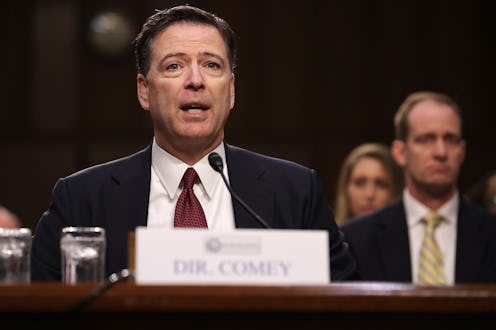
On Thursday morning, James Comey testified before the Senate Intelligence Committee in a highly anticipated hearing. The testimony addressed Russian interference in the presidential election, the Trump campaign's ties to Russia, and Comey's own interactions with the president. On this last point, the former FBI director made a particularly staggering statement — Comey wrote down his conversations with Donald Trump because he believed the president might later distort the contents of their meetings.
"I was honestly concerned that he might lie about the nature of our meeting," Comey told the committee.
That the head of an intelligence agency would express such explicit concerns about a president's honesty is troubling. Trump's critics would not be surprised that his honesty is in question, but Comey's reasons for keeping written records of his interactions with the president should worry people nonetheless. It was, however, a wise decision on Comey's part, especially now that it's known that the president requested Comey's loyalty and pushed him to clear up the president's public image.
In that vein, Comey also told the committee that he believed he and the FBI had been defamed by Trump and his administration. When asked why he was fired, Comey said he still was not sure. He remarked that explanations for his sacking kept shifting from his alleged mishandling of the Hillary Clinton email investigation to claims that the FBI was "poorly led." Here, too, Comey's written records are vital, because they indicate that the president could have been holding Comey's employment as a bargaining chip in his demands for loyalty.
Here is a transcript of Comey's exchange with Virginia Sen. Mark Warner, who pressed Comey to explain what prompted him to keep these written records:
WARNER: Now, you said after that briefing you felt compelled to document that conversation that you, actually started to document it as soon as you got into the car. Now, you have had extensive experience at the Department of Justice and at the FBI. You have worked under presidents of both parties. What was it about that meeting that led you to determine that you needed to start putting down a written record?
COMEY: A combination of things. I think the circumstances, the subject matter, and the person I was interacting with. Circumstances first, I was alone with the President of the United States. ... I was talking about matters that touch on the FBI's core responsibility and that relate to the President —President-elect personally, than nature of the person. I was honestly concerned he might lie about the nature of our meeting, so I thought it was important to document that combination of things I never experienced before. But it led me to believe I have to write it down and I have to write it down in a very detailed way.
WARNER: I think that's a very important statement you just made.
It is worth noting, as Warner and Comey both pointed out, that Comey did not keep similar records of his conversations with former President Barack Obama. During the hearing, Comey said that he once had a one-on-one conversation with Obama about race and policing that lasted for at least an hour, but this meeting did not trigger similar concerns about the president's likeliness to lie.
Comey's detailed documentation of his interactions with Trump are especially valuable because they highlight some of Trump's authoritarian tendencies. It wasn't just loyalty that Trump wanted from Comey — it was obedience. He didn't want to simply suggest that Michael Flynn was a good guy; he wanted to encourage — if not order — the FBI to end its investigation into Flynn.
Comey's published remarks offer a great deal of insight into how the president operates, and to what extent he will go to control any and all narratives about him and his administration. And as demonstrated by Comey's ongoing testimony, his remarks serve to hold Trump accountable, which will be extremely important going forward.